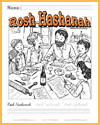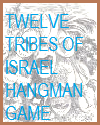Learning about Rosh Hashanah, the Jewish New Year, offers your K-12 students a meaningful window into Jewish culture, ethics, and traditions while fostering interdisciplinary connections. This autumnal holiday's themes of reflection, repentance, and renewal provide rich opportunities for social-emotional learning, encouraging students to consider their own actions, set intentions for the future, and practice empathy and forgiveness. Rituals like sounding the shofar (ram's horn) and symbolic foods (e.g., apples and honey) introduce your students to sensory-rich cultural practices that illustrate values like hope and sweetness in the year ahead.
For your older students, Rosh Hashanah can serve as a gateway to exploring broader historical and religious concepts, such as the lunar calendar's role in Judaism, the holiday's biblical origins, or comparisons with other New Year celebrations worldwide. This promotes global awareness and religious literacy, countering stereotypes and building respect for diversity.
Additionally, discussing this fall holiday's emphasis on community and accountability helps students grasp how cultural traditions reinforce collective identity and moral responsibility. These lessons cultivate critical thinking, cultural empathy, and a deeper understanding of how faith shapes human experience. |


















































